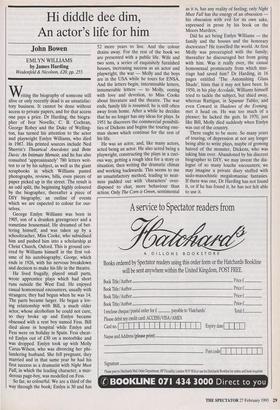Hi diddle dee dim, An actor's life for him
John Bowen
EMLYN WILLIAMS by James Harding Weidenfeld & Nicolson, f20, pp. 255 citing the biography of someone still alive or only recently dead is an unsatisfac- tory business. It cannot be done without access to private papers, and for that access one pays a price. Dr Harding, the biogra- pher of Ivor Novello, C. B. Cochran, George Robey and the Duke of Welling- ton, has turned his attention to the actor and playwright Emlyn Williams, who died in 1987. His printed sources include Ned Sherrin's Theatrical Anecdotes and Bette Davis: An Intimate Memoir, and he has also consulted 'approximately' 780 letters writ- ten to or by his subject, as well as the giant scrapbooks in which Williams pasted photographs, reviews, bills, even pieces of paper picked up in the street. The result is an odd split, the beginning highly coloured by the biographer, thereafter a piece of DIY biography, an outline of events which we are expected to colour for our- selves.
George Emlyn Williams was born in 1905, son of a drunken greengrocer and a sometime housemaid. He dreamed of bet- tering himself, and was taken up by a schoolteacher, Miss Cooke, who subsidised him and pushed him into a scholarship at Christ Church, Oxford. This is ground cov- ered by Williams himself in the first vol- ume of his autobiography, George, which ends in 1926, with his nervous breakdown and decision to make his life in the theatre.
He lived frugally, played small parts, wrote apprentice plays which had short runs outside the West End. He enjoyed casual homosexual encounters, usually with strangers; they had begun when he was 14. The parts became larger. He began a lov- ing relationship with Bill, a much older actor, whose alcoholism he could not cure, so they broke up and Emlyn became obsessed with a rent boy named Fess. Bill died alone in hospital while Emlyn and Fess were on holiday in Spain. Fess cheat- ed Emlyn out of £30 on a motorbike and was dropped. Emlyn took up with Molly Cams-Wilson, who was divorcing her phi- landering husband. She fell pregnant, they married and in that same year he had his first success as a dramatist with Night Must Fall, in which the leading character, a mur- derous page-boy, was modelled on Fess.
So far, so colourful. We are a third of the way through the book; Emlyn is 30 and has 52 more years to live. And the colour drains away. For the rest of the book we are presented with a public life. Wife and two sons, a series of exquisitely furnished houses, increasing success as an actor and playwright, the war — Molly and the boys are in the USA while he tours for ENSA. And the letters begin, interminable letters, innumerable letters — to Molly, oozing with love and devotion, to Miss Cooke about literature and the theatre. The war ends, family life is resumed; he is still often away from home. After a while he decides that he no longer has any ideas for plays. In 1951 he discovers the commercial possibili- ties of Dickens and begins the touring one- man shows which continue for the rest of his life.
He was an actor, and, like many actors, acted being an actor. He also acted being a playwright, constructing the plays in a curi- ous way, getting a rough idea for a story or situation, then writing the dramatic climax and working backwards. This seems to me an unsatisfactory method, leading to neat- ness padded out with 'characters' over- disposed to chat, more behaviour than action. Only The Corn is Green, sentimental as it is, has any reality of feeling; only Night Must Fall has the energy of an obsession his obsession with evil for its own sake, expressed in prose by his book on the Moors Murders.
Did he act being Emlyn Williams — the family and the houses and the honorary doctorates? He travelled the world. At first Molly was preoccupied with the family; thereafter he discouraged her from going with him. Was it really over, the casual homosexual promiscuity from which mar- riage had saved him? Dr Harding, in 16 pages entitled 'The Astonishing Glass Shade', hints that it may not have been. In 1950, in his play Accolade, Williams himself tried to tackle the subject, but shied away, whereas Rattigan, in Separate Tables, and even Coward in Shadows of the Evening, met it head on. He was too much of a pleaser; he lacked the guts. In 1970, just like Bill, Molly died suddenly when Emlyn was out of the country.
There ought to be more. So many years of touring, of depression at not any longer being able to write plays, maybe of growing hatred of the monster, Dickens, who was taking him over. Abandoned by his discreet biographer to DIY, we may invent the dia- logue of so many louche encounters; we may imagine a private diary stuffed with sado-masochistic megalomaniac fantasies. If there was one, Dr Harding has not found it, or if he has found it, he has not felt able to use it.


















































 Previous page
Previous page